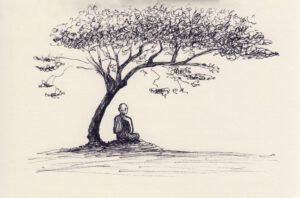
Without understanding, meditation practice can degenerate to profound self-absorption or escapism.
December 5, 2021
Many years ago, I had a first-time meet with a new client. He was excited about having been immersed in Buddhism and meditation for approximately six months. He asserted that he was now a completely different person, calm, peaceful, and swimming in equanimity.
After we spent some time getting to know each other I said, “Jim, you’ve been on several retreats, surrounded by like-minded people. How is it back in the world with your family and at your job?” He didn’t answer my question. Instead, he continued to focus on making sure I understood how changed he was.
When I said, “My experience is that although meditation can feel soothing and peaceful at times, at other times, it can be painful, especially in the early years. Have you experienced any discomfort on retreat? Sitting in silent meditation for lengthy periods can bring us face to face with parts of ourselves we haven’t fully acknowledged. Parts that we find unattractive. Have you run into any of that yet?”
At that point, to my dismay, Jim shut down. He didn’t come back.
I learned an important lesson— be considerate and gentle when someone is floating in a bubble of meditation bliss. I don’t need to pop that bubble — it will, at some point, crumble on its own for most folks.
Why Meditate?
A primary goal of meditation is to free us from self-deception. And ultimately, meditation helps us see the futility of holding tightly to any rigid perspective or preconceived notion, positive or negative.
I’m not being flippant when I say that we all at times want something to soothe our anxieties and lift our depressive thoughts. But meditation, in and of itself, is not a cure-all.
Meditation is a way to loosen our solidity with and attachment to our thoughts and beliefs. But we can also use it to do the opposite if we’re not careful.
I heard a podcast by Joseph Goldstein, a fantastic meditation teacher in the Shambhala tradition. He gave a Dharma talk on spiritual self-absorption when he was on a three-month silent retreat. He said, “We all know that person who has been meditating for twenty years and is still a self-absorbed jerk!”
Meditation is not a road to perfection; it’s a road to awareness and reality. And for most of us, that involves discomfort.
To truly reap the benefits, we need to make peace with the parts of ourselves we’d prefer to avoid. Otherwise, we’ll sit on the edge of what’s possible. We may never understand that the goal of meditation is to make friends with discomfort (or at least make peace with it with as little resistance as possible).
Three Antidotes to Spiritual Self-Absorption or Escapism
These three elements can help keep us from spending twenty years practicing meditation only to end up being a bigger jerk than we were when we started:
Self-awareness, Intention, and Action.
Self-Awareness
Most of us have endless perspectives and points of view to which we’re attached. Until we can loosen our grip on what we think and feel, we can be prisoners of our ideas, rather than experiencers of our true nature.
Without self-awareness, even the most inspired perspective can become rigid ideology.
Intention
Suppose we aren’t clear about our intention, i.e., to become more self-aware and ultimately benefit others. In that case, we can use meditation to elevate ourselves in our own eyes. Or to escape the reality that life can be tricky, often uncomfortable, and ultimately, pretty much out of our control.
Action
Right action means that we more successfully interact with the world — within every area of our lives. As a result, we experience a greater sense of purpose, deliberateness, and thoughtfulness. And bring more of the same to the world.
Supporting our meditation practice with all three elements — self-awareness, intention, and right action — will likely create positive changes with our families, workplaces, and communities.
Rather than escaping from the world, we develop a more balanced reaction to what life hands us. We learn to sit with discomfort and watch it come and go. We know to let it be rather than force it to leave.
Bringing it all Together
Bringing self-awareness, intention, and action to a meditation practice can help us stay on track. As a result, we’re better able to navigate the discomfort of coming face to face with our humanness and limitations.
So, meditation, in and of itself, is not a cure-all for the human condition. But it can be a vehicle to bring us back to our authentic, imperfect, mortal selves.
As meditation has become less secular — more about self-care and a connection with our spirituality than about religion — it offers greater opportunity to practice different approaches and explore various schools.
Regardless of what school or path you explore, it should be showing you the way back to this moment, the present moment, in touch with the basic goodness of who you are.
Much love,
